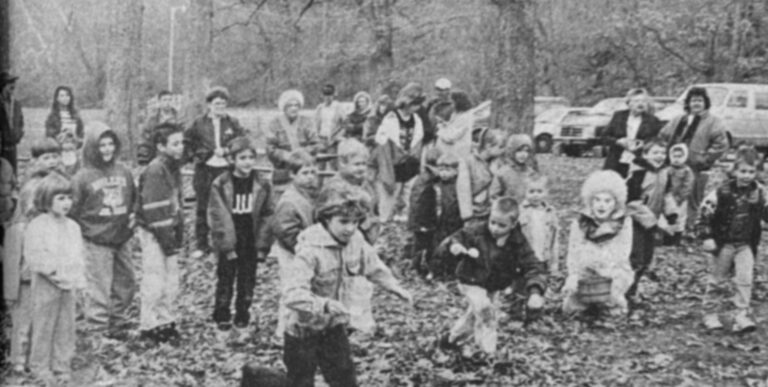50 years ago
April 18, 1973
— Full implementation of a five year capital improvements program is accepted for the Missouri State park system. “$1,304,900 will be spent at Roaring River State Park near Cassville,” according to Gerald B. Rowan, chairman of the state’s park board. Rowan made the figures available during a talk to the local Rotary Club today. Included in the park improvements are camp sites costing $300,000; and an interpretive center costing $150,000. Accompanying Rowan on the visit here was James L. Wilson, recently appointed director of Missouri’s vast park system. Covering the full run of Missouri park statistics and programs for the future, Rowan’s remarks were as follows: “Missouri has facilities located on 75,380 acres of its 57 historic sites, archaeological sites, and state parks. The system contains 1,433 buildings, 1,147 acres of man-made lakes, 89 miles of shoreline on Lake of the Ozarks and over 40 miles of major streams bordering or flowing through parks. There are 3,600 camp sites, 14 group camps and 2,300 picnic units in the parks. There are cabin and motel facilities in 10 of the parks, dining lodges in 9 of the parks, and public swimming pools at five of the parks.
— Barry County has added another first to its attributes…..tops in fescue seed production in the nation. Last year’s production of seed in the county, estimated to run over five mi-lion pounds was about one-twentieth of the total produced in the United States, one hundred million pounds. One of the major buyers of the grass seed, Brooks Pennington, Jr., of Pennington Grain and Seed, Inc., in Madison, Georgia, was in the area this past weekend making preparations for improving buying facilities at Washburn and contracting producers. According to reports, Pennington told local interests that there was little holdover of fescue seed from last year’s crop, making predictions for this year indicate increased priced. During the last crop year seed was bringing 10 cents a pound, which resulted in a ha-If million-dollar crop in the area.
— The Cassville board of education has requested a boundary change situation between he R-4 district and Jenkins be submitted to a board of arbitration. Superintendent James Ford said the action came during the regular Monday night meeting of the board. A boundary change request between Cassville and Jenkins was voted upon during recent elections, with petitions from the landowners involved being presented and requiring the election. The proposal was soundly defeated in the rural district with Cassville voters giving approval. This split decision makes a board hearing necessary if requested by the district giving voter approval. Ford said the final decision on boundary lines between the two districts will now be made by a board of arbitration consisting of four disinterested persons and Charles Vaughan, County school’s superintendent.
— A Cassville family found themselves right in the middle of a running gun battle Saturday evening. Returning from Rogers, Arkansas, the Bob Mizer family indirectly became involved in the apprehension of three persons wanted after a jail break in Oklahoma. The Mizer family was headed home when they were passed by a car, from which shots were being fired. Thinking it might have been a prankster, they continued on their way, only to discover later that individuals in the car were firing at a member of the Arkansas highway patrol that was pursuing the fugitives. Aim of the three men, two of whom were wanted for investigation of murder in California, was good enough to hit the patrol car windshield and radiator, forcing it out of commission. None of the shots hit the Mizer car.
40 years ago
April 13, 1983
— Cassville city government Covered routine monthly business items Tuesday night until the agenda called for a discussion of a shutoff of water at FASCO Industries last Friday. Councilmen then turned to possible operational procedures that would eliminate the possibility of such an accident happening again. Tim Miller, water superintendent, told the council a wrong valve was turned in an effort to cut-off service to Wells Aluminum to make repairs to that plant’s line. The mistake in action resulted in the 450-employee plant being without water. As a result, and without information as to how long the service would be discontinued, employees were dismissed at 8:30 a.m. Councilman John Miller, a quality control director for the plant, said the dismissal Of employees resulted in considerable loss of wages. The rupture of a pair of two-inch lines inside the plant when the Service was resumed, also was costly. Water in certain areas of the plant could have resulted in more serious damage,” Miller told the council. He estimated company loss at between $5,000 and $10,000 and employee losses at $20,000. Actual downtime of the outage was about 30 minutes. However, the plant did not know this at the time and discontinued operations as a safety factor and prevention of damage to equipment.
— A gravel screening and washing plant installed recently by Barry County Ready Mix Concrete began operation this week. Corky Stehlik, owner, said the gravel screening and washing plant is located just off Highway 248 about 2.5 miles east of Cassville. Stehlik said the plant would perform about seven functions, using area creek gravel as the initial material. Included will be extraction of concrete and asphalt sand, road chips, concrete rock, sewage lateral line rock, fill material, black dirt silt and washed ornamental rock. Materials will be used in the readymix business and for use by private contractors in the area. The plant is rated to produce aggregate at the rate of 100 yards per hour. Creek gravel from a number of available sources in the area will be used to produce the new operations final products.
— The results of the ASCS Paymentin- Kind Program for Barry County have been released, says Kerby Brooks, office executive. Participation in the program for enrolled farms was 47.9 percent for wheat and 39.9 percent for corn and grain sorghum. This level of participation was similar to the national average. A record amount of acreage reduction in 1983 is expected as farmers agree to take land out of production in return for a percentage of the commodity they would normally grow. The program was designed because of weak export demand and record level production in 1981 and 1982. Under average weather conditions production declines resulting from the acreage decrease could be about a fifth for wheat and grain sorghum, a fourth for cotton and rice, and about a third for corn. Area farmers participating in the program are reminded of reporting deadline of June 1, and July 15, for fall and spring seeded crops.
— Mrs. Ann Frye has been named new secretary to the University of Missouri Extension Center in Barry County. She will be in charge of office functions of the center located in Cassville. Her husband, Tim Frye, is a vice-president at Commerce Bank of Barry County.
— Spec. 4 Jerry W. Hartin, nephew of Buddie Hart of Star Route, Cassville, has completed A U.S. Army primary non-commissioned officer course in Katterbach, West Germany. During the course, students studied general military subjects with special emphasis on leadership training. The course includes training in long-range patrol and survival training, as well as escape and evasion techniques. These smallunit tactics are designed to enhance leadership abilities. Hartin is an infantryman with the first Armored Division in Bamberg, West Germany. He is a 1980 graduate of Cassville high school.
30 years ago
April 7, 1993
— County Clerk Rex Stumpff said acceptance of punch card voting went exceptionally well in Barry County as the method was used for the first time in history Stumpff said final printouts of 26 precincts were received from the computer at 8:45 p.m. Tuesday night’s poll returns are considered official, since checking is accomplished on the number of ballots voted at each precinct against that reported by the computer. Precinct judges provide the numbers that are read automatically in the scanning process. Another road district election, Sugar Creek, will be required later this year since no ballot was provided for this district through the new voting method. Stumpff said voters and especially election workers were well satisfied with the new process. Out of 4,393 votes cast, reading equipment rejected only six as being voted improperly. Complete tabulations on road districts, due to write-in and other counting that will be required by review of some ballots, will be available next week.
— Voters of the district were kind 10 Cassville R-4 schools Tuesday, passing a $4.3 million bond issue that will eventually build a complete high school unit at an off-campus location. Just over 51 percent of the district’s voters cast ballots giving a yes vote of 1060 to 689 against. Needing a four-sevenths majority for passage, the largest bond issue in the history of the Cassville district squeaked by on a 60.61 percent favorable and 39.39 percent negative vote. The state mandated majority for bond issues in April elections required a 57 percent approval. A light voter turnout might have meant the difference in the issue, as just over half of the district’s 3,786 registered voters went to the polls.
— Bashan Hill, a publishing ministry in Thomas Hollow community near Exeter, “has never been connected in any way with the branch group in Waco, Texas,” according to Jeriel E. Bingham, vice-president. Bingham said the Davidian Seventh-Day Adventist Association at Thomas Hollow, “is not a division of the Seventhday Adventist Church. While is has a common religious heritage with the Adventist Church, it is an independent publishing ministry with a worldwide outreach,” he stated. Continuing with an explanation of their operations at the rural location, Bingham stated,” as a publishing ministry, there is no need to evangelize people away from their churches, since they can read our two hundred publications for themselves and make their own decision about it.” Bashan Hill, was founded in May 1970 by M. J. Bingham. The extensive printing facilities public literature that is distributed throughout the world. The company has maintained good relations within local communities throughout their existence. Bingham has appeared on broadcast programs within the past few weeks that were later viewed nationwide. In each the local printing mission has disavowed any association with the Koresh group in Waco, Tx., that has been under siege by federal authorities for several weeks.
— First Christian Church of Cassville will begin a new ministry in August 1993 with the opening of God’s Little Kingdom, a preschool and day care facility. The church board approved the venture this month. Brenda Samuel and Rita Rogers, former Cassville elementary school teachers, will serve as directors of the facility. Samuel will primarily oversee the infant to three-year-old day care program, and Rogers will direct the preschool. Four other teachers will be hired to help teach at each age level. Day care will be provided 12 months of the year, and the preschool will operate in concert with the Cassville school calendar. Existing church facilities will be utilized for the school, which will be large enough to accommodate 60 children. Rogers, who has operated Mrs. Rogers Neighborhood preschool from 1986 to present, will close the school at the end of the school year. God’s Little Kingdom will be similar to her operation of Mrs. Rogers Neighborhood with added emphasis on the Bible and Christian values. Preschool students will also be involved in creative experiences in music, art and physical education.
— There are 66 members of the newly formed Men’s Club at the Cassville Golf Association, according to Rex Pietz, club professional. The group was formed recently to promote special activities among members of the association. Pietz said officers chosen for the group included Jack Farrow, president; Fred Wood, tourney chairman and Truman Baker, secretary- treasurer.
— Missouri farm population dropped 36 percent during the 1980s, according to the newsletter of University Extension’s Office of Social and Economic Data Analysis. According to 1990 census figures, Missouri’s farm population was 180,000, about half what it was in 1970. The farm population is 3.5 percent of Missouri’s total population. In a five-county area of southwest Missouri, statistics on trends over the past 20 years included: Barry, 1990 farm population 2,277, compared to 4,445 in 1980 and 5,458 in 1970. The percent of change in the first 10 years of the period 16.7 and 49.9. In 1970 farm-people were 27.9 percent of the county’s population, dropping to 8.3 percent in 1990.
— David Payne, a CHS graduate, is a cast member of Central Missouri State University’s production of Hamlet April 21-24. He is a freshman theatre major.







